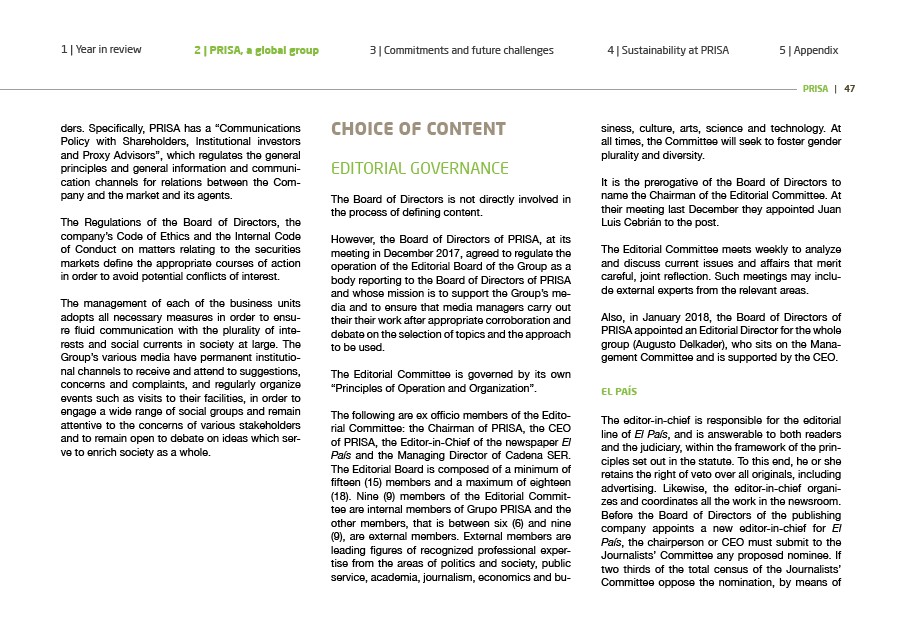
1 | Year in review 2 | PRISA, a global group 3 | Commitments and future challenges 4 | Sustainability at PRISA 5 | Appendix
PRISA | 47
ders. Specifically, PRISA has a “Communications
Policy with Shareholders, Institutional investors
and Proxy Advisors”, which regulates the general
principles and general information and communication
channels for relations between the Company
and the market and its agents.
The Regulations of the Board of Directors, the
company’s Code of Ethics and the Internal Code
of Conduct on matters relating to the securities
markets define the appropriate courses of action
in order to avoid potential conflicts of interest.
The management of each of the business units
adopts all necessary measures in order to ensure
fluid communication with the plurality of interests
and social currents in society at large. The
Group’s various media have permanent institutional
channels to receive and attend to suggestions,
concerns and complaints, and regularly organize
events such as visits to their facilities, in order to
engage a wide range of social groups and remain
attentive to the concerns of various stakeholders
and to remain open to debate on ideas which serve
to enrich society as a whole.
CHOICE OF CONTENT
EDITORIAL GOVERNANCE
The Board of Directors is not directly involved in
the process of defining content.
However, the Board of Directors of PRISA, at its
meeting in December 2017, agreed to regulate the
operation of the Editorial Board of the Group as a
body reporting to the Board of Directors of PRISA
and whose mission is to support the Group’s media
and to ensure that media managers carry out
their their work after appropriate corroboration and
debate on the selection of topics and the approach
to be used.
The Editorial Committee is governed by its own
“Principles of Operation and Organization”.
The following are ex officio members of the Editorial
Committee: the Chairman of PRISA, the CEO
of PRISA, the Editor-in-Chief of the newspaper El
País and the Managing Director of Cadena SER.
The Editorial Board is composed of a minimum of
fifteen (15) members and a maximum of eighteen
(18). Nine (9) members of the Editorial Committee
are internal members of Grupo PRISA and the
other members, that is between six (6) and nine
(9), are external members. External members are
leading figures of recognized professional expertise
from the areas of politics and society, public
service, academia, journalism, economics and business,
culture, arts, science and technology. At
all times, the Committee will seek to foster gender
plurality and diversity.
It is the prerogative of the Board of Directors to
name the Chairman of the Editorial Committee. At
their meeting last December they appointed Juan
Luis Cebrián to the post.
The Editorial Committee meets weekly to analyze
and discuss current issues and affairs that merit
careful, joint reflection. Such meetings may include
external experts from the relevant areas.
Also, in January 2018, the Board of Directors of
PRISA appointed an Editorial Director for the whole
group (Augusto Delkader), who sits on the Management
Committee and is supported by the CEO.
EL PAÍS
The editor-in-chief is responsible for the editorial
line of El País, and is answerable to both readers
and the judiciary, within the framework of the principles
set out in the statute. To this end, he or she
retains the right of veto over all originals, including
advertising. Likewise, the editor-in-chief organizes
and coordinates all the work in the newsroom.
Before the Board of Directors of the publishing
company appoints a new editor-in-chief for El
País, the chairperson or CEO must submit to the
Journalists’ Committee any proposed nominee. If
two thirds of the total census of the Journalists’
Committee oppose the nomination, by means of